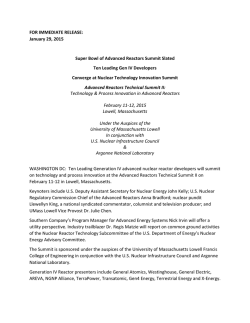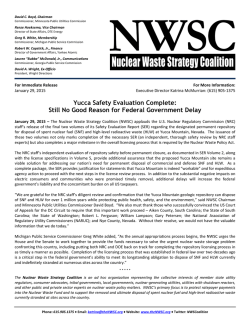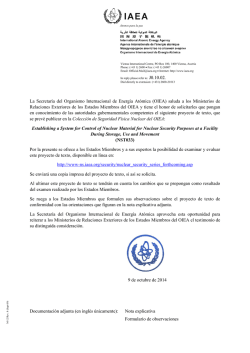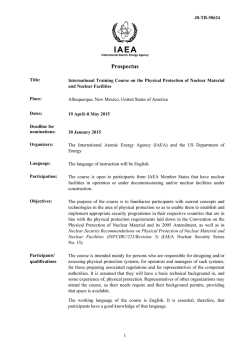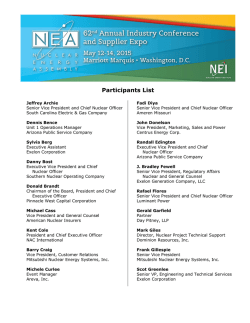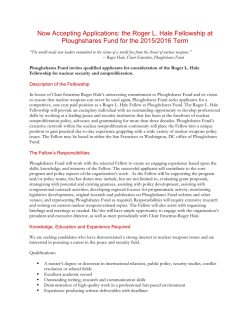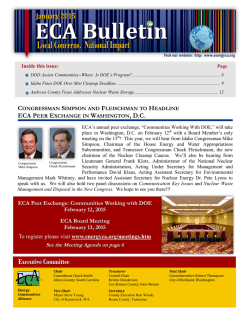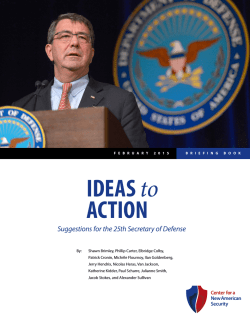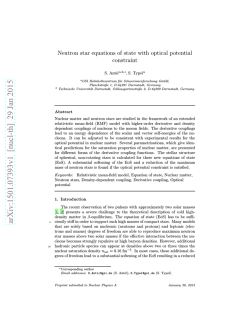
Peaceful destruction in Fukushima: Oxymoron Reidentified
PEACEFUL DESTRUCTION IN FUKUSHIMA: OXYMORON REIDENTIFIED AASHRIKA AHUJA1 Abstract : Are nuclear weapons more important than my life? Can’t we use million dollars to generate electricity in any other way ? Is possessing nuclear weapons more prestigious than my right to live in an environment where I am not exposed to risk of cancer and genetic diseases? Do we really have no choice but to live under a constant fear of abandoning our houses when there is an accidental radiation fallout? What kind of national security are you extending to the citizens of your country by placing the life of millions of others in jeopardy? Cries of a fetus falling on deaf ears highlights the bankruptcy of imagination displayed by leading political thinkers who advocate peaceful uses of nuclear energy and the so called “Big Five” in their stance they have maintained so far on the issue of non-proliferation. Just as fire is extinguished by water, hatred and distrust can only be defeated by courage and compassion. The preamble to the Treaty on Non-Proliferation to Nuclear Weapons encourages the use of nuclear technology for peaceful purposes and goes onto state that parties will extend their support for research and development and efforts to further the application, within the framework of the International Atomic Energy Agency safeguards system, of the principle of safeguarding effectively the flow of source and special fissionable materials by use of instruments and other techniques at certain strategic points. It further provides that nuclear weapon states shall make available the benefits of peaceful applications of nuclear technology, including any technological by-products which may be derived by nuclear-weapon States from the development of nuclear explosive devices to all Parties of the Treaty, whether nuclear-weapon or non-nuclear weapon States. Not only this, all Parties to the Treaty are entitled to participate in the fullest possible exchange of scientific information for, and to contribute alone or in cooperation with other States to, the further development of the applications of atomic energy for peaceful purposes. The inherent structure of the 1 Law Researcher, Punjab and Haryana High Court ,India. 1 treaty wreaks of double standards whereby it out rightly divides the world into nuclear haves and have nots. Such a stance portrayed by a leading international instrument along with the support to use of nuclear technology for peaceful purposes even after witnessing the havoc wreathed by accidental radiation fallouts points towards incoherence in world politics. The trust and cooperation mandatorily required for an assault against this global threat will not bear any fruit till the time some of us flaunt our disarmament obligations on one side and display a passion for non proliferation on the other side. The urge to possess huge stockpile of nuclear weapons and generation of electricity by building high-end nuclear power facilities indeed distinguishes them from the low man on totem pole but their prestige and honor in acquiring these weapons of mass destruction under the garb of generating electricity in a cheap way will lead to a situation where not only one country but many neighboring countries will end up paying a huge price in the form of death and injury to million people as well as widespread destruction to the environment. They won’t think twice before attacking and no Airplanes, Hijackers or suicide bombers will be required this time to wage a war on terror. It is time to unleash the nightmare of nuclear terrorism. Denying the availability of technology in the hands of terrorists and living in a fool’s paradise exposes the entire human race to the risk of annihilation. Those who advocate use of nuclear energy for peaceful purposes and rate it as a necessary evil should be treated as “robbers of life”. The preamble to UN charter expressly states that it aims to reaffirm faith in fundamental human rights, in the dignity and worth of the human person and in the equal rights of men and women . The preamble to Universal Declaration of Human Rights which lays down international standards for protecting human rights recognizes the inherent dignity and equal and inalienable rights of all members of the human family as the foundation of freedom, justice and peace in the world. Freedom to live with dignity encompasses freedom not only to live free from any kind of fear but also to live freely in an environment with no insecurity about abandoning houses, businesses, kith and kin and dearest of friends. What kind of a dignified life is it when you have to evacuate your town, wait for the rest of your life for a missing son and daughter, live in a temporary housing and spend sleepless nights under the fear of an insecure future. Chernobyl, Three Mile Island and now Fukushima has proved once again that nuclear technology though used for a peaceful purpose is not necessary but only an evil and anyone who advocates the use of this technology should be punished for carrying out a crime against humanity as a whole. Fukushima is a warning that cries out for an end to this debate and being forewarned means being forearmed. People of every nation desire a peaceful existence. We created weapons of mass destruction and it is upto us to utilize our intellect for constructing a palace of trust . No matter how many treaties we sign and how many conferences we hold, till the time there is a transformation in the consciousness of the peoples of the world, we cannot achieve any progress in securing peace. It is essential that the discriminatory nature of the treaty of non proliferation is done away with and equal responsibility be placed upon the shoulders of nuclear weapon states who instead of dictating the terms to be followed by non nuclear weapon states reform their attitude by performing their obligations. Mahatma Gandhi has said “ Strong are never vindictive and dialogue can only be engaged in by the brave”. Initiating an open and frank dialogue requires courage but it is the surest path to resolve mutual discords and misunderstandings. It is time for the leaders of all the nations whether big or small to really prove that they are leaders in the real sense and possess exemplary courage to break through this never ending impasse. Each day thousands of children are dying because they don’t have enough to eat; another thousand never see their first birthday just because instead of spending millions of dollars in providing them with basic necessities, their leaders are busy in squandering money in building a stockpile of latest 2 high-tech missiles which they claim to never intend to use. The five-year Review Conference of the Parties to the Treaty on the Non-Proliferation Weapons scheduled for the year 2015 will be crucial and can be used as a launching pad for heads of the states to display their mettle as humanistic leaders for whom interests of people are of paramount significance. A resolution to give up on the weakness to dominate others by putting them under a threat of bombing them with this and that weapon requires courageous action and wise definitely understand the need of the hour better than the foolish. 3 Formidable proposal initiated by Mr. Dwight D. Esenhower on 8 DECEMBER , 1953 at 2.45 PM while addressing the 470th Plenary Meeting of United Nations General Assembly turned on a dime when he introduced people of the world to the constructive power of the same man whose genius lead to the invention of an inherently destructive weapon. Three Mile Island in Pennsylvania, Chernobyl in Ukraine and Fukushima in Japan have proved to what extent a man’s peaceful pursuits have accomplished the goal of constructing a peaceful society . Due to painstaking efforts undertaken by those involved at the helm of affairs, the world was indeed successful in constructing cities with radiation as their strong foundation and environments with people inhaling iodine in its purest form. The concept of “Atoms for peace” and the incident in Fukushima has demonstrated that the route to peace cannot begin from a factory where they supply raw materials for making bombs. Blowing smoke by generating a few tonnes of electricity will only end up as a disaster. Coming up with a new reactor design will be futile in mitigating the ongoing threat posed by accidents, terrorists and human error. Even if for the sake of argument it is accepted that the new reactors are invulnerable to every kind of accident, the legacy of radioactive waste and its disposal will always haunt the generations to come. People advocating Sustainable Development amidst this harsh reality have to rethink and redouble their efforts to achieve a sustainable society because the question regarding disposal of nuclear waste turns the idea of sustainability completely over its head. The main argument put forth by those who have put in high stakes in the nuclear industry is that to tackle climate change, global green house gas emissions have to be reduced to a considerable amount and nuclear energy is the only route to fulfill the rising energy demands. The advocates makes it look like an attractive choice by harping about the fact that no green house gases are emitted while generating electricity through a nuclear power plant but when put forward a question regarding the disposal of poisonous radioactive waste generated through the process, they have no plausible answer. A research carried out for the European Union concluded that when looking at the whole cycle of nuclear generation, from mining the uranium to decommissioning the plants, nuclear power stations would produce around 50% more greenhouse gas emissions than wind power2. A Threat to right to survival is a Human Right violation Article 7 of the Rome Statute of International Criminal Court, 1998 defines “Crime against Humanity” as an offence which results into an attack on the right to live a dignified life 3. Not only selected individuals who were a party to revolutionizing the use of an atom for a peaceful purpose but each and every person who has been engaged in the struggle to channelize atomic energy into satisfying the peaceful pursuit of mankind should be condemned for committing an act of intentionally causing great suffering, serious injury to body and to mental and physical health. Peace has never been nor will ever be realised until and unless each and every human being alive on this planet is living without any threat to survival from any source whatsoever . Preamble to Universal Declaration of Human Rights categorically provides that recognition of human dignity is the foundation of peace and this has been unanimously accepted by the peoples of the world 4. The central axis which lends credence to all the rights chartered out in any international document outlaying human rights is recognition of the dignity inherent in a human being. Right to life enshrined as the lynchpin among all other rights not only includes mere animal existence but also a right to a dignified life. Freedom from food insecurity, right to proper access to drinking water, Right to breathe clean air, right to live in an environment free from fear and threats are offshoots of this basic right5 and constitute an important component of International Humanitarian Law. But 11 March 2011 out rightly brought alive the worst nightmare when catastrophic systematic failure of 4 the Japanese society to fathom the inherent nature of atoms for peace resulted in an accident of an overwhelming scale leaving hundreds of people suffering unnecessarily. Further, International Covenant on Economic, Social and Cultural Rights6 casts a burden on the States to ensure proper conditions for protecting and safeguarding the health of not only the present generation but future generation as well. Readiness of a State to squander millions of rupees on constructing a nuclear power plant instead of taking adequate measures to provide a secure life to its citizens squarely demonstrates that politics at the world level involves stakes which are higher than the value of a human life. The entire Nuclear Fuel cycle is fraught with incidences of grave human right violations at each and every stage commencing from mining of uranium to the disposal of radioactive waste. An unskilled and an illiterate miner is ready to expose himself to lung cancer and TB for few dollars and his human right violations are not even an issue when in a round table conference , shortage of electricity is being discussed by the privileged few. Reports indicate that Mine workers inhale poisonous gases which contribute to birth defects, high infant mortality and chronic lung, eye, skin and reproductive illnesses7 The next stages in a nuclear fuel cycle including uranium milling, processing, enrichment, fuel fabrication, reactor operation and radioactive waste dumping are fraught with an unending series of massive human rights violations too. When the principle endeavor of the State becomes anything accept providing a dignified and a secure life to its citizens then no matter what position it stands on at the world map; its foundations will char and crumble into ashes even with a minor seismic movement. Analysis of Fukushima incident and Government response to the Crisis Prima facie we can blame the nature for causing havoc in the Fukushima region but if we analyze the entire situation we cannot refrain from calling it a manmade disaster. The Government, the Regulator and the Private Plant Operator demonstrated to what extent power hungry animals can stoop down after being driven by an urge to earn profit at the cost of endangering lives of people of their own country. Betraying the right of the nation’s people to be safe from nuclear accidents when they indulged themselves in this destructive undertaking at the behest of development of Japan and providing cheap electricity has proved to be a mistake which cannot be undone. Fukushima is a warning to all those involved in the dirty politics that electricity generated in this way can never be cheap because the value of losing a loved one, seeing your son / daughter die of radiation exposure, evacuating from your roots and having nothing to sustain yourself for days all together is indeed an affair which is much more expensive than what we can possibly imagine. Perhaps generation of electricity is just a sham and the real motive is to maintain a position on world map to be associated with the sophisticated lot who possess the best technology to deter terrorists and any other nation in case they decide to go nuclear first. Fukushima event was characterized at Level 7 on International Nuclear and Radiological Event Scale which is defined as follows – “An event resulting in environmental release corresponding to a quantity of radioactivity radiologically equivalent to a release to the atmosphere of more than several tens of thousands of terabacquerels8. Both the plant owner and regulatory authority were aware that owing to the sensitivity of the region, the design base of the nuclear reactors should be such which minimizes and includes within its 5 ambit an earthquake measuring 9.0 on Richter scale and tsunami waves exceeding a height of 10-20m. It is a stark reality that the safety measures and introduction of important emergency procedures recommended by IAEA were neglected thereby resulting in a catastrophe9. No doubt the emergency shutdown system started running concurrently with the onset of seismic activity but the blatant failure of backup lines to respond at that crucial juncture on account of mismatched sockets portrays utter disregard and negligence on the part of regulator in taking proper safeguards while managing the power plant. The land in the adjoining area has been rendered infertile, water in surrounding areas and food products were contaminated to an extent rendering them unfit for human intake. Moreover, the export from Japan took a backseat adding to the misery of the people. In short, the entire incident has raised a big question mark on the credibility of all global policy makers who intend to use nuclear energy in any way. Owing to its inherently destructive nature, no matter how many precautions we take, even a small loophole if left unchecked can wreak havoc not only in one area but the entire world at large. False assertions by the government and regulators regarding radiation leakages along with the scale of damage owing to their inability to deal with the crisis has furthered resentment in the hearts of Japanese population. Evacuation and dislocation of about three hundred thousand people from their communities and destruction of social fabric of the nation can never be compensated by the regulator in monetary terms. Proliferation concerns and Double Standards perpetrated by Non Proliferation Treaty The seed for bringing to life an internationally acclaimed instrument signifying a phenomenal shift in the thought process among the leading thinkers of the world regarding usage of nuclear weapons was sowed at 470th Plenary Meeting of United Nations General Assembly held in the year 1953 when President Dwight Esenhower gave a historic speech steering the wheels in a completely different direction. The declaration laying down a mandate for giving birth to an international treaty specifying the role of the world superpowers in phasing out nuclear weapons and moving towards disarmament was indeed remarkable but the biggest lacuna in this leading instrument is the premise on which its foundation rests upon. Developing one’s country and fulfillment of rising energy demands by using an inherently destructive source at the behest of placing lives of millions of people in jeopardy is in no way helping us construct a peaceful world. On the contrary, sharing of scientific knowledge on handling radioactive elements with the selected few and debarring the rest raises high the banner of mistrust and insecurity among the nations. Creation of International Atomic Energy Agency indeed is a positive step but the efforts so far have relatively been futile in restricting the knowledge regarding uses of uranium and plutonium to a selected group of states. Further, the newly discovered high definition techniques like Global Laser Enrichment and Gas Centrifuge pose an increasing challenge to the capacity of this international watchdog to cope up with the changing times. The fact that a country like Iraq could easily hoodwink International Atomic Energy Agency’s inspectors is an enormous blow to the safeguard mechanism that is claimed to be foolproof in combating nefarious designs of few people. It has been a consistent stand among the international elite that this technology is beyond the reach of unscrupulous elements. Discovery of undercover experiments suspected to be initiated by Iran, Iraq and North Korea bears testimony to the fact that the classification of states into nuclear weapon states and non nuclear weapon states endorsed by the treaty has resulted in greater animosity and fuelling of the feelings of distrust among nations of the world. The arrogance of the nuclear weapon states on account of possessing know how relating to potential uses of fissile material accompanied by their failure to fulfill their obligations 6 enshrined in the treaty may not only backfire the entire process of reaching negotiations in phasing out nuclear weapons but can also give birth to few more AQ Khans. Research also indicates that when a country is running a civilian nuclear programme and it faces a security threat from neighboring countries then there is a possibility that it might want to divert the technology received for peaceful purposes towards initiating a weapons programme. Further, declaration by enemy nation that it possesses nuclear weapons can serve as major driver for any state to make efforts in acquiring the same. Irony of the whole situation is that the text of the treaty on Non- proliferation of Nuclear Weapons begins with a concrete affirmation that proliferation of nuclear weapons will inadvertently enhance the danger of annihilation of the entire human race and at the same time the treaty reaffirms faith in peaceful application of nuclear technology. History has time and again proved that destruction is inevitable wherever there is application of nuclear technology in any form. Fukushima is a warning that humanity is only heading towards darkness by indulging itself into exploring an arena which starts and ends with nothing but destruction. Article VI of the Treaty casts a duty on all the member states to enter into negotiations for putting an end to nuclear arms race but the basic premise of the treaty rests on exchange of scientific know how and related nuclear technology which will inevitably lead to dissemination of information and knowledge needed to embark on with a weapons program. The most crucial stage in generating electricity through a nuclear power plant is the technique of uranium enrichment and reprocessing of plutonium which can inadvertently be used as a fissile material for making a nuclear weapon. It is an indisputable fact that Uranium 235 powers both nuclear reactors and nuclear bombs. The concentration of uranium 235 further needs to be increased to about 5 percent (low-enriched uranium) for nuclear reactor fuel and to about 90 percent (highly enriched uranium) for nuclear bombs. This process is called enrichment. Exactly the same machines that produce nuclear fuel can produce weapons material. That is why uranium enrichment technology is inherently dual-use. Any civilian enrichment facility can be used to produce nuclear weapons material10. This is what keeps International Atomic Energy Agency on its toes and this is where the risk lies. Further, the byproduct of uranium enrichment which after being molded into a form of a weapon used at the time of Gulf Wars i.e. depleted uranium has a history of causing cancers, birth defects and deaths11. This implies that exchange of information will ultimately end up equipping and arming the receiver state with the pre requisites for indulging into forbidden practices. Civilian nuclear programs necessitate familiarity with the handling of radioactive materials, processes for fuel fabrication and materials having chemical or nuclear properties, and the operation and function of reactors and electronic control systems. They also provide experience in other crucial fields, such as metallurgy and neutronics12.” The main purpose for which the treaty saw light of the day was to fulfill the common desire of the peoples of the world who came together at the United Nations General Assembly to prevent dissemination of nuclear weapons. No doubt, the policy makers and the heads of the states throughout the world have a noble intention of putting an end to a nuclear era but a stronger commitment is required to protect the right of every person on this planet to live a dignified life free from any kind of threat to survival. It is time that this right is construed in the light of environment in which we live. A nuclear accident in Fukushima is a nuclear accident everywhere because all of us belong to one family and are citizens of one planet. Contamination of environment is not only limited to Japan and Europe but at the 7 fundamental level; it engulfs lives of many living beings. This idea of a global family has lost its meaning in today’s metropolitan society where head of one country is only concerned about people residing with the borders. This demarcation of borders has been created by us and if we make an effort to do away with it, we will realize that all of us experience the same pain when we see our loved ones dying of incurable diseases and becoming victims of deformities of all kinds. Case Studies: Nuclear Power and Nuclear weapons are Siamese twins Following examples demonstrate how a country which has embarked on a process of boiling water by resorting to a nuclear power plant ; can acquire nuclear warheads easily. Not only Israel, Pakistan and North Korea but almost every country which has access to this technology ; in the thurst of developing itself undertakes to experimenting with diverting the fissile material, technology for forbidden uses. Israel Israel belongs to a group of states who have refused to be a part of Nuclear Non Proliferation Treaty and at the same time has raised burgeoning security concerns for the West in terms of its weapons program sustained by clandestine acquisition of the technology under the pretext of fulfilling rising energy demands. France was the first country to supply research reactor to Israel and it was at that time in 1950’s that the foundation for a full fledged weapons program was laid out. Though, Israel has maintained a consistent stand of not possessing any warheads but the investigations reveal that Israel possesses around 80 warheads13. The fact was substantiated by a statement of former Knesset speaker this year by declaring that the non disclosure policy is now an open secret. Admission by Israeli agents about their involvement in secretly buying fissile material and feeding the industry is indeed a positive sign but proactive steps will have to be taken by International agencies to ensure that Israel complies with the basic international norms. Journalist, Otfried Nassauer has confirmed that Israel's successful weapons program was based on a plutonium production reactor and a reprocessing plant ostensibly provided for peaceful purposes by France without safeguards and under substantial secrecy. Norway had provided heavy water for peaceful purposes. The uranium reportedly came from Argentina, Niger, South Africa, and others. About 200 tons was scheduled to come from a Belgian ship from which it disappeared in 1968 while the ship was at sea. Pilfering of technology in this way by purchasing yellowcake without following proper safeguards, disappearance of huge quantities of fissile material from the stock, illegal export and import of uranium by Israeli agents, conducting nuclear tests and refusing to cooperate with security officials of International Atomic Energy Agency raises multifarious security concerns. It is high time that these signs be taken as warnings and proper steps be taken by the International community to solve issues regarding proliferation in such a way. Pakistan It is an admitted fact that Pakistan has a nuclear weapons program running through the length and breadth of the country. Being surrounded with neighbors engaged in acquiring state of the art 8 technology no doubt raises security concerns but more important than the concerns of the government are the concerns regarding handling of fissile material and technology by non state actors. After facing a crushing defeat in Indo-Pak war in the year 1971, Zulfikar Ali Bhutto pronounced that “If India builds the bomb, we will eat grass and leaves for a thousand years, even go hungry, but we will get one of our own. The Christians have the bomb, the Jews have the bomb and now the Hindus have the bomb. Why not the Muslims too have the bomb?” It is against this backdrop that the existing nuclear power program of Pakistan started gaining new heights in 1970’s. Further, clandestine network of Abdul Qadir Khan to obtain the necessary materials and technology by misusing his position at URENCO for developing Pakistan’s uranium enrichment capabilities illustrates that development of this technology for deterrence purposes is not what the country is aiming at. Recently, it has been reported that Pakistan is slowly increasing its capacity to produce plutonium at its Khushab nuclear facility. Out rightly refraining from following “no – first use” doctrine as its prime policy and refusing to acknowledge the threats and activities of non state actors will only lead to exacerbation of the problem. It is high time that the country embarks upon a systematic process to manage its nuclear facilities with proper safeguards and generate trust among its international counterparts that the country is not a support base for nefarious designs carried out by the non state actors claiming to be citizens of Pakistan. North Korea The country has been first in line from withdrawing from the Nuclear Proliferation Treaty in the year 2003. It is a classic example of how under the pretext of acquiring technology for “peaceful purposes”, it is possible to construct highly sophisticated weaponry. North Korea is an example which makes it amply clear how politics dictates the decisions whose brunt has to be borne by ordinary people. After acceding to Nuclear Proliferation Treaty, North Korea refused to sign up declarations with International Atomic Energy Agency and put pressure on United States to withdraw nuclear weapons from South Korea. Not only in this case, but these pressure tactics are resorted to by almost all the countries which further hinders growth of diplomatic relations between countries. Mistrust and disbelief is what has transpired into a bitter relationship between North Korea and the United States which was cordial once upon a time. Frequent inspections and tests by the IAEA, coupled with North Korea's refusal to comply with some requests from the IAEA has always been a critical issue since 1980’s. Further, reports have time and again affirmed that large volumes of plutonium continue to be unloaded from reactor site through spent fuel reprocessing. Following a protracted international controversy, North Korea and the US signed an "Agreed Framework" in October 1994. Among other things the Agreement provided for a verified freeze of the activities at the North Korean facilities believed to have supported the weapons program, the eventual dismantling of those facilities, removal of some material including spent fuel from the five MW(e) 9 reactor, and the construction of two power reactors of a design less suitable for producing weapon grade plutonium than the Magnox design of the three power reactors built or partially built by North Korea. Progress on implementation of the Agreed Framework has been stop-start and it remains a long way from fruition as at 2002.North Korea has a four MW(th) IRT research reactor as well as a critical assembly and a sub-critical assembly, all supplied by the Soviet Union and all under IAEA safeguards. These research reactors do not seem to have been involved in the weapons program to any significant degree. However it is likely that a small quantity of plutonium was separated in the 1970s, before IAEA safeguards were applied, using the IRT research reactor to produce the plutonium and hot cells (also supplied by the Soviet Union) to separate it14. Atomic Energy Agency’s inspectors were ordered to leave the country owing to their frequent inspection schedules and since then attempts have been made to reconcile differences. International community has time and again tried to constrain clandestine activities of the country but it is a stark reality that north Korea is not happy with the way nuclear weapon states are trying to gain monopoly over the nuclear market. The entire nuclear industry is being modernized and expanded basically as an outrage over the double standards maintained by the nuclear weapon states. Surreptitious activities being carried out at Yongbyon and the linkages with AQ khan network substantiates that not just North Korea but the entire world has become vulnerable and susceptible as a war zone. Nuclear Energy is not the solution In some instances the mere possession or attempted construction of research reactors and commercial nuclear plants has been enough to bring on the threat of war. This "provocation" was enough to justify the Israeli bombing of Iraq's French-built Osirik reactor in 1981, and was one of the alleged reasons for the Gulf War in 1991. The mere inkling that your neighbor might have the capability to make nuclear weapons suddenly becomes the justification for acquiring these weapons. Signing of Nuclear Cooperation Agreements is not a solution for tackling the changing scenario of global climate for they not only culminate into negotiations for supplying essential components for running a nuclear power reactor but also provide training to scientists in handling radioactive elements. Construction delays and Cost overruns further make the argument to switch over to nuclear energy a less viable one. The Olkiluoto 3, an EPR, construction project in Finland is rapidly becoming an example of all that can go wrong in economic terms with nuclear new build. In December 2006, after only 16 months of construction, Areva announced the reactor was already 18 months behind schedule, and it now seems likely that the project will fall at least €700m over budget. This is the story of almost every reactor nowadays. Dealing with escalation of oil prices and combating energy shortages seems to be a cumbersome process but indulging into trading of nuclear technology along with increasing confidence in nuclear energy being the only way to cope up with rising power demands does not seem to be a good bargain. What is holding back the non nuclear weapon states and the states who have refused to ratify any international instrument whether a treaty or Additional Protocol from entering into a commitment towards disarmament is the attitude of few states looked upto as a role model. If The United States, China, Japan, Soviet Union and France take a bold stand in taking the first step in debarring the use of atomic energy for any purpose whatsoever then the other nations will definitely follow . The very act on the part of United States in refraining from signing Comprehensive Test Ban Treaty has added fuel to the fire thereby giving an indication that the commitment towards disarmament is still a pipe dream. These 10 double standards depict the inherently callous nature of man to restrain the other and at the same time refrain from doing what he prohibits the other from doing. Lulling someone into a false sense of security will only be detrimental to a secure and healthy relationship to which states are devoting greater energies at this critical juncture. More than one billion people in the world live on less than one dollar a day and eleven million children die every year without reaching the age of five. Preventing diseases like malaria, diarrhea and pneumonia seems like a dream for most of them. 114 million children have never seen what a school looks like and 584 million women are exploited ceaselessly owing to illiteracy15. Principles enshrined in the UN Charter were never meant to exclude those 114 million children and 584 million women. If the leaders of the world decide then the figures quoted above can come down to zero. Draining the finances by indulging into acquiring weapons never intended to be used and giving more priority to generation of electricity by further stagnating funds in building reactors is not going to lead to development in its real sense. Apart from being an economic liability and adding an increasing burden on the taxpayer, nuclear industry is far from being cheap in the real sense. Rather, it operates at a loss because even a fraction of the amount of money invested does not come back in the form of profit. Even if it does, time lag between construction and actual operation of the plant nullify the profit earned owing to escalation in costs. One of the glaring examples is the Bataan nuclear power plant which was commissioned by President of the Philippines, Ferdinand Marcos, in response to the oil crises of the 1970s. The intention was to increase the Philippines’ energy independence. An agreement was made with Westinghouse to build a 620 MW nuclear reactor. Construction work started in 1974. Following the Three Mile Island accident in the United States, the construction stopped for safety checks, which revealed over 4,000 defects. It was completed in 1984 after costing the country $ 2.3 billion US dollars – nearly five times the originally proposed cost of $ 500 million. For 20 years, funding Bataan was the Philippines government’s largest overseas debt. It was finally paid off in 2007, 32 years after construction began. Japanese Government is ready to spend $ 13 billion as a part of its cleanup operation after Fukushima. The entire money could have saved millions of lives but we are deaf and we are blind. We have forgotten what happened at Chernobyl. These accidents brought about damages of global proportions and it is about time we open our eyes and have the courage to at least acknowledge the fact that we are wrong. We may be equipped with the best technology for development but ultimately we are digging our own grave by forgetting the basic purpose behind why we are leading. It was certainly not to work for the betterment of a handful who happen to be in one country and leave a handful in the clutches of death who stay across the borders. The solution has to be taken at a level where people come together at a common platform leaving their designations behind. Concentrating and obsessing over only one solution to the problem of energy shortage will cast a limit upon alternative horizons which we can explore in order to combat the problem in a clean and a green way in the real sense. Moreover, the possibility of a terrorist attack over nuclear power facilities cannot be ruled out. It is time we start learning lessons from our past experiences. In 1972, three hijackers took control of a DC-9 of Southern Airlines and threatened to crash it on the Oak Ridge military nuclear research reactor. December 1977 witnessed Basque separatists setting off bombs damaging the reactor vessel and a steam generator and killing two workers at the Lemoniz Nuclear Power Plant under construction in Spain. In, February 1993, At Three Mile Island NPP (Pennsylvania), a man crashed his station wagon through the security gate and rammed the vehicle under a partly opened door in the turbine building16. We cannot sit back and rely on our safeguards because the history has time and again proved 11 that a nuclear accident need not occur only as a result of human error, natural disaster or accident. It can occur in multifarious ways at any point of time and in any way. The basic idea behind signing The Non-Proliferation Treaty for Non- nuclear Weapon States was that nuclear weapon states would also march forward by taking concrete action in the sphere of disarmament but the nuclear weapon states have consistently demonstrated through their conduct that the road to disarmament is a long one and they are not keen about even to start walking on the road. With increasing number of countries signing civilian nuclear agreements, the goal of achieving disarmament, sustainable development and world peace have started seeming to be an impossible affair. United States and some Russian countries have indeed made a sporadic start but the idea of signing of disarmament treaties for converting nuclear weapons into fuel for electricity between United States and countries of former USSR17 is not enough to prove that earnest commitment to ones responsibilities. Suggestions The year 2015 can play a significant role in opening a new era whereby a new dimension can be accorded to the concept of human rights. The Non Proliferation Treaty Review conference can be a springboard for ushering in a new age where dignity of a human being is given its due. Though, the expenses incurred on installing nuclear power plants are humongous but as they say journey of a thousand miles starts with a single step. Decommissioning will be indeed an expensive affair but a start can be made by entering into negotiations at the conference for phasing out use of highly enriched uranium along with removal of weapons – usable uranium from research facilities throughout the world. One trillion dollars proposed to be incurred by United States on modernizing and maintaining nuclear weapons along with a 100 billion GBP modernization programme planned by the United Kingdom should be abandoned at the NPT conference17 and this bold step by two of the world’s leading countries will certainly pave the way for a positive outcome. Huge investment paraphernalia in the nuclear industry prevents and makes intractable, the investment in any other energy intensive industry for exploring new horizons. Channelizing funds towards development renewable sources of energy can be a bane for the entire humankind. Every state which seeks to develop itself by resorting to constructing a sound nuclear base is ultimately at the mercy of a handful of countries like United States, France, Russia, Canada, Japan and China because the route to development starts from these countries only. From mining to waste management, at every step of the nuclear fuel cycle, the assistance from these countries is inevitable in order to embark successfully in this endeavor. Pledging the sovereignty partially and national dependence on these countries has become order of the day for the unfortunate lot who were technologically left behind. The only course which can be adopted by these countries is to advance at their pace in opening up new horizons in tackling the menace of energy shortage. In this way, they can acquire monopoly over a new technology being exclusively within their domain of invention and also command respect on the international level from the superpowers. Renewable source of energy is the only solution but it depends on us how much we can harness it . United Nations should undertake forming of a separate committee for assessing damage caused by nuclear power plants and he statistics should be laid out in the open. Formation of an International Treaty providing for concrete ways in which states can phase out their reactors and pool in resources to explore solar, wind, biomass etc can offer solution to myriad problems of nuclear weapon states and other states who have a nuclear power program. Since decommissioning will be an expensive affair, an International body can be created for providing funds and concessions to countries which show willingness to take the bold step. 12 International Atomic Energy Agency’s role should be revamped and it should be invested with the power to impose sanctions on those states who indulge into trading in nuclear technology. As, such the entire Non Proliferation Treaty has to be given a new foundation. A special treaty for management of Radioactive wastes should be formed and the draft can be worked out in such a way that countries which have generated higher quantity of waste than the specified limit in the treaty should pay a certain amount of tax and the money collected in this way should form a part of the budget of the International body which will be created for funding decommissioning activities. The road seems long but it is the only and a direct route to changing history. Instead of expecting from others to fulfill obligations enshrined in the UN Charter and other leading international instruments, each state can take the initiative to be the change. Courageous and bold action taken by one individual to start a dialogue can help achieve a breakthrough to this impasse plaguing the world since last century. The year 2015 will be crucial but it is not those at the helm but ordinary citizens who have to voice their opinion and stand up. Arnold Toynbee has stated “We are not doomed to make history repeat itself; it is open to us, through our own efforts, to give history, in our own case, some new and unprecedented turn.” In the words of President Obama,; just as we stood for freedom in the 20 th century, we must stand together for the right of people everywhere to live free from fear in the 21st century. References [1] Greenpeace briefing, climate change- nuclear not the answer, Stephanie T http://www.greenpeace.org/international/PageFiles/24507/briefing-nuclear-not-answerapr07.pdf [2] http://www.icc-cpi.int/nr/rdonlyres/ea9aeff7-5752-4f84-be94 0a655eb30e16/0/rome_statute_english.pdf [3] http://www.un.org/en/documents/udhr/index.shtml [4] http://www.hrc.co.nz/report/chapters/chapter07/life01.html [5] http://www.ohchr.org/EN/ProfessionalInterest/Pages/CESCR.aspx [6] Uranium mining – impact on health and environment – published by Rosa Luxemburg Stiftung, Dar es Salaam, April 2014. [7] http://www.ncbi.nlm.nih.gov/pmc/articles/PMC3606704/ Root causes and Impacts of Severe accidents at large Nuclear Power Plants [8] The Carnegie Papers, Why Fukushima was preventable, James M. Acton and Mark Hibbs, Nuclear Policy , March 2012. [9] Spreading Temptation “Proliferation and Peaceful Nuclear Cooperation Agreements” Matthew Fuhrmann [10] Converting a civilian enrichment plant into a nuclear weapons material facility by Ivanka Barzashka, Bulletin of the Atomic Scientists, 14 January 2014. [11] The links between nuclear power and nuclear weapons, A CND briefing by Davida Higgin, April 2006 [12] http://www.unmillenniumproject.org/resources/fastfacts_e.htm 13 [13] http://www.theguardian.com/world/2014/jan/15/truth-israels-secret-nuclear-arsenal [14] Case Studies: Civil Nuclear Programs and Weapons Proliferation, Jim Green [15] Greenpeace, Nuclear Power- An obstacle to Rapid Development, 4 November, 2009 http://www.greenpeace.org/international/en/publications/reports/nuclear-power-an-obstacleto/ [16] A world free of nuclear weapons By George P. Shultz, William J. Perry, Henry A. Kissinger and Sam Nunn ,The Wall Street Journal,January 4, 2007 [17] Nuclear Reactor Hazards Ongoing Dangers of Operating Nuclear Technology in the 21st Century, by Helmut Hirsch, Oda Becker, Mycle Schneider, Antony Froggatt April 2005 [18] 2014 NPT Preparatory committee Briefing Book, A program of Women’s International League for Peace and Freedom , A P. 14
© Copyright 2026
